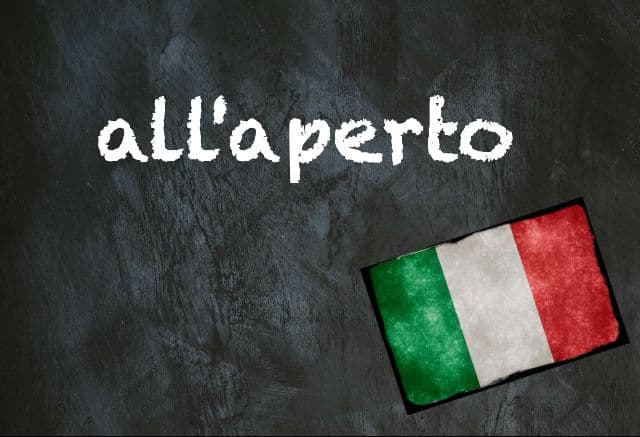
Italian expression of the day: 'All'aperto'

Why might you see this phrase all over Italian headlines?
You'll need to get to grips with this expression if you want to avoid a hefty fine: Italy has just made face masks mandatory all'aperto, or 'outdoors'.
Find out more about the latest rules here.
Aperto is the past participle of the verb aprire ('to open'), which is why you'll probably recognise it from shop doors (far better to find something aperto ('open') than chiuso, 'closed').

Photo: Andreas Solaro/AFP
Like in English you can also use it of people, to say they're 'open-minded' or 'frank'.
I miei sono molto aperti.
My parents are very open-minded.
Adoro le persone di carattere aperto.
I love people who are open by nature.
But unlike in English, you also use aperto to mean 'switched on' when you're talking about a tap or a gas pipe, for instance (which naturally means that chiuso can be 'switched off').
Mannaggia, ho lasciato il gas aperto.
Dammit, I left the gas on.
All'aperto literally means 'in the open', and it emphasises the fact that there's nothing between you and the outdoors. That's why it's sometimes more like saying 'open-air' than just 'outside'.
If you're feeling poetic, you can extend the phrase a little and say all'aria aperta ('in the open air'). Just don't swap it for al fresco: that means something quite different in Italian to the way we understand it in English.
Che estate è senza cinema all'aperto?
What's summer without open-air cinema?
Abbiamo dormito all’aria aperta, sotto le stelle.
We slept in the open air, under the stars.
And that's why it's just the phrase to describe Italy's new rules on face masks: when masks are declared "obbligatorio all'aperto" ('compulsory outside'), it makes clear that the government isn't just talking about wearing them in public places like shops and cafés, it specifically means you have to wear them even when you're 'out in the open'.
Nel Lazio introduciamo l’obbligo di mascherina all’aperto. Ho appena firmato l’ordinanza. Di fronte all’aumento della curva dei contagi dobbiamo alzare il livello di guardia e di prevenzione. La sicurezza prima di tutto
— Nicola Zingaretti (@nzingaretti) October 2, 2020
What's the opposite of all'aperto? That would be all'interno, 'inside'.
And whichever one you are, so long as you're fuori ('out of the house' or 'outdoors'), remember that from today you'll have to take your face mask.
Do you have a favourite Italian word you'd like us to feature? If so, please email us with your suggestion.
Comments
See Also
You'll need to get to grips with this expression if you want to avoid a hefty fine: Italy has just made face masks mandatory all'aperto, or 'outdoors'.
Find out more about the latest rules here.
Aperto is the past participle of the verb aprire ('to open'), which is why you'll probably recognise it from shop doors (far better to find something aperto ('open') than chiuso, 'closed').

Photo: Andreas Solaro/AFP
Like in English you can also use it of people, to say they're 'open-minded' or 'frank'.
I miei sono molto aperti.
My parents are very open-minded.
Adoro le persone di carattere aperto.
I love people who are open by nature.
But unlike in English, you also use aperto to mean 'switched on' when you're talking about a tap or a gas pipe, for instance (which naturally means that chiuso can be 'switched off').
Mannaggia, ho lasciato il gas aperto.
Dammit, I left the gas on.
All'aperto literally means 'in the open', and it emphasises the fact that there's nothing between you and the outdoors. That's why it's sometimes more like saying 'open-air' than just 'outside'.
If you're feeling poetic, you can extend the phrase a little and say all'aria aperta ('in the open air'). Just don't swap it for al fresco: that means something quite different in Italian to the way we understand it in English.
Che estate è senza cinema all'aperto?
What's summer without open-air cinema?
Abbiamo dormito all’aria aperta, sotto le stelle.
We slept in the open air, under the stars.
And that's why it's just the phrase to describe Italy's new rules on face masks: when masks are declared "obbligatorio all'aperto" ('compulsory outside'), it makes clear that the government isn't just talking about wearing them in public places like shops and cafés, it specifically means you have to wear them even when you're 'out in the open'.
Nel Lazio introduciamo l’obbligo di mascherina all’aperto. Ho appena firmato l’ordinanza. Di fronte all’aumento della curva dei contagi dobbiamo alzare il livello di guardia e di prevenzione. La sicurezza prima di tutto
— Nicola Zingaretti (@nzingaretti) October 2, 2020
What's the opposite of all'aperto? That would be all'interno, 'inside'.
And whichever one you are, so long as you're fuori ('out of the house' or 'outdoors'), remember that from today you'll have to take your face mask.
Do you have a favourite Italian word you'd like us to feature? If so, please email us with your suggestion.
Join the conversation in our comments section below. Share your own views and experience and if you have a question or suggestion for our journalists then email us at [email protected].
Please keep comments civil, constructive and on topic – and make sure to read our terms of use before getting involved.
Please log in here to leave a comment.